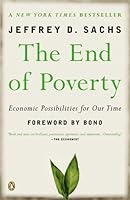 Book cover via AmazonIn 2003, economist Jeffrey Sachs addressed the General Convention of the Episcopal Church. In that address, Sachs stated, “Ours is the first generation in the history of the world with the ability to eradicate extreme poverty. We have the means, the resources and the know-how. All we lack is the will." It is that statement that inspired the title for this blog - "Do We Have the Will?" Sachs is one of my heros. He is one of the leading voices arguing that it is possible to accomplish the MDG's and to eliminate extreme poverty by 2025. (Sachs is director of The Earth Institute at Columbia University).
Book cover via AmazonIn 2003, economist Jeffrey Sachs addressed the General Convention of the Episcopal Church. In that address, Sachs stated, “Ours is the first generation in the history of the world with the ability to eradicate extreme poverty. We have the means, the resources and the know-how. All we lack is the will." It is that statement that inspired the title for this blog - "Do We Have the Will?" Sachs is one of my heros. He is one of the leading voices arguing that it is possible to accomplish the MDG's and to eliminate extreme poverty by 2025. (Sachs is director of The Earth Institute at Columbia University).In his bestselling book, The End of Poverty: Economic Possibilities for our Time, Sachs says "Our generation's challenge is to help the poorest of the poor to escape the misery of extreme poverty so that they may begin their own ascent up the ladder of economic development" (24). I would add to that challenge that of saving the planet from environmental catastrophe (check out this video of Al Gore at the TED Conference, where he talks about the opportunity to create another "hero generation). But I agree with Sachs. If we have the means, how can we not have the will? Sachs concludes The End of Poverty by saying, "Let the future say of our generation that we sent forth mighty currents of hope, and that we worked together to heal the world" (368).
Yesterday, Sachs wrote an editorial in The Namibian called "Where Are The Global Leaders?". His first statement: "THE G-8 Summit in Japan earlier this month was a painful demonstration of the pitiful state of global cooperation." He goes on to give his critique of the efforts put forth by the leaders of the G-8 of whom he says, "It's too embarrassing to watch grown men and women gather for empty photo opportunities."
I'll share this quote with you and then let you read the rest for yourself if you are so inclined:
"President Bush may be too unaware to recognise that his historically high 70% disapproval rating among US voters is related to the fact that his government turned its back on the international community - and thereby got trapped in war and economic crisis.
"The other G-8 leaders presumably can see that their own unpopularity at home is strongly related to high food and energy prices, and an increasingly unstable global climate and global economy, none of which they can address on their own.
"Starting in January 2009 with the new US president, politicians should take the best chance for their own political survival, and of course for their countries' well-being, by reinvigorating global cooperation.
"They should agree to address shared global goals, including the fight against poverty, hunger, and disease (the Millennium Development Goals), as well as climate change and environmental destruction."

![Reblog this post [with Zemanta]](http://img.zemanta.com/reblog_e.png?x-id=e568f141-9a88-4df9-b930-50782255ca7b)




No comments:
Post a Comment